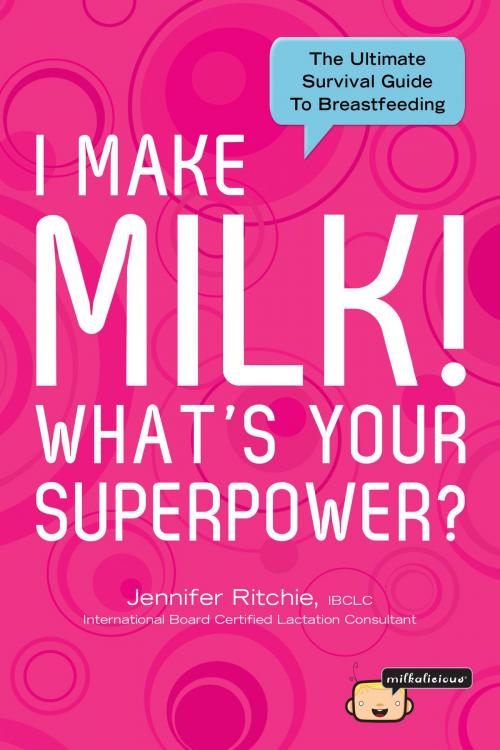I Make Milk, What's Your Superpower?
The Ultimate Breastfeeding Guide
Nonfiction, Family & Relationships, Family Relationships, Motherhood| Author: | Jennifer Ritchie, IBCLC | ISBN: | 9781624886966 |
| Publisher: | BookBaby | Publication: | January 1, 2013 |
| Imprint: | Language: | English |
| Author: | Jennifer Ritchie, IBCLC |
| ISBN: | 9781624886966 |
| Publisher: | BookBaby |
| Publication: | January 1, 2013 |
| Imprint: | |
| Language: | English |
Finding answers to your breastfeeding questions can be frustrating to say the least. When you look online, less than half of the websites that contain breastfeeding information are accurate. Instead you can refer to this book whenever you have a question; it is your Lactation Consultant in a cute little package. Regardless if you are having problems now, or if you are simply gaining knowledge of potential breastfeeding pitfalls, this is the book for you. We will talk about what to expect from breastfeeding, and what to do if issues arise. The great thing about breastfeeding is that there is a solution to almost every problem. In most cases we can trick the body into doing what we want it to do, and we can observe our babies behavior to give us insight on what the problem is. Did you know? #1: Most breastfeeding problems occur in the first two weeks of a child’s life, so lots of new moms just throw in the towel. That's why your focus in the beginning is to just make it past the first 2 weeks. #2: There is a chance you will not make enough milk to completely feed your baby with breast milk alone. This is also a big reason why give up breastfeeding altogether. If you have to supplement with some formula, that is okay! DO NOT beat yourself up about it! One drop of breastmilk contains one million white blood cells, so some is better than none. If you don’t make enough milk, if you need to go back to work at 6 weeks and can’t afford a pump, or if you are just too overwhelmed, that’s ok! If your baby gets at least 1 teaspoon of breastmilk per day, your baby will be protected with the antibodies and those bacteria-eating cells that are so important to a developing immune system. Pretend you just qualified to be in the Breastfeeding Olympics, and you have some fierce competition. Instead of other athletes, your competition is hormonal imbalances, breast anatomy, insufficient milk removal, yeast, bacteria, and good old-fashioned pain. I am not telling you to go to the store and stock up on formula, I just want you to go into this challenge with determination, but knowing that you may have some setbacks. Just because you get knocked down doesn’t mean you have to give up, ladies! Studies show that although over 80% of women start breastfeeding in the hospital, only 12% of babies in the US are getting any breastmilk at 6 months of age. Based on my patients' feedback, the decline is not due to lack of effort but the anxiety caused by breastfeeding problems or the concern that the baby is not getting enough. Most of the 3,000+ patients I have seen have told me they would have given up if it weren't for the help they received at Milkalicious. Now, we are bringing Milkalicious to you, with the ultimate breastfeeding guide, "I Make Milk, What's Your Superpower".
Finding answers to your breastfeeding questions can be frustrating to say the least. When you look online, less than half of the websites that contain breastfeeding information are accurate. Instead you can refer to this book whenever you have a question; it is your Lactation Consultant in a cute little package. Regardless if you are having problems now, or if you are simply gaining knowledge of potential breastfeeding pitfalls, this is the book for you. We will talk about what to expect from breastfeeding, and what to do if issues arise. The great thing about breastfeeding is that there is a solution to almost every problem. In most cases we can trick the body into doing what we want it to do, and we can observe our babies behavior to give us insight on what the problem is. Did you know? #1: Most breastfeeding problems occur in the first two weeks of a child’s life, so lots of new moms just throw in the towel. That's why your focus in the beginning is to just make it past the first 2 weeks. #2: There is a chance you will not make enough milk to completely feed your baby with breast milk alone. This is also a big reason why give up breastfeeding altogether. If you have to supplement with some formula, that is okay! DO NOT beat yourself up about it! One drop of breastmilk contains one million white blood cells, so some is better than none. If you don’t make enough milk, if you need to go back to work at 6 weeks and can’t afford a pump, or if you are just too overwhelmed, that’s ok! If your baby gets at least 1 teaspoon of breastmilk per day, your baby will be protected with the antibodies and those bacteria-eating cells that are so important to a developing immune system. Pretend you just qualified to be in the Breastfeeding Olympics, and you have some fierce competition. Instead of other athletes, your competition is hormonal imbalances, breast anatomy, insufficient milk removal, yeast, bacteria, and good old-fashioned pain. I am not telling you to go to the store and stock up on formula, I just want you to go into this challenge with determination, but knowing that you may have some setbacks. Just because you get knocked down doesn’t mean you have to give up, ladies! Studies show that although over 80% of women start breastfeeding in the hospital, only 12% of babies in the US are getting any breastmilk at 6 months of age. Based on my patients' feedback, the decline is not due to lack of effort but the anxiety caused by breastfeeding problems or the concern that the baby is not getting enough. Most of the 3,000+ patients I have seen have told me they would have given up if it weren't for the help they received at Milkalicious. Now, we are bringing Milkalicious to you, with the ultimate breastfeeding guide, "I Make Milk, What's Your Superpower".















